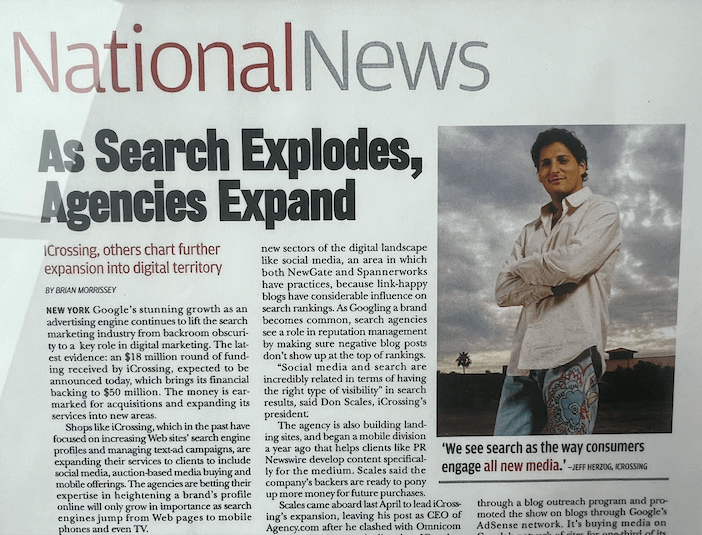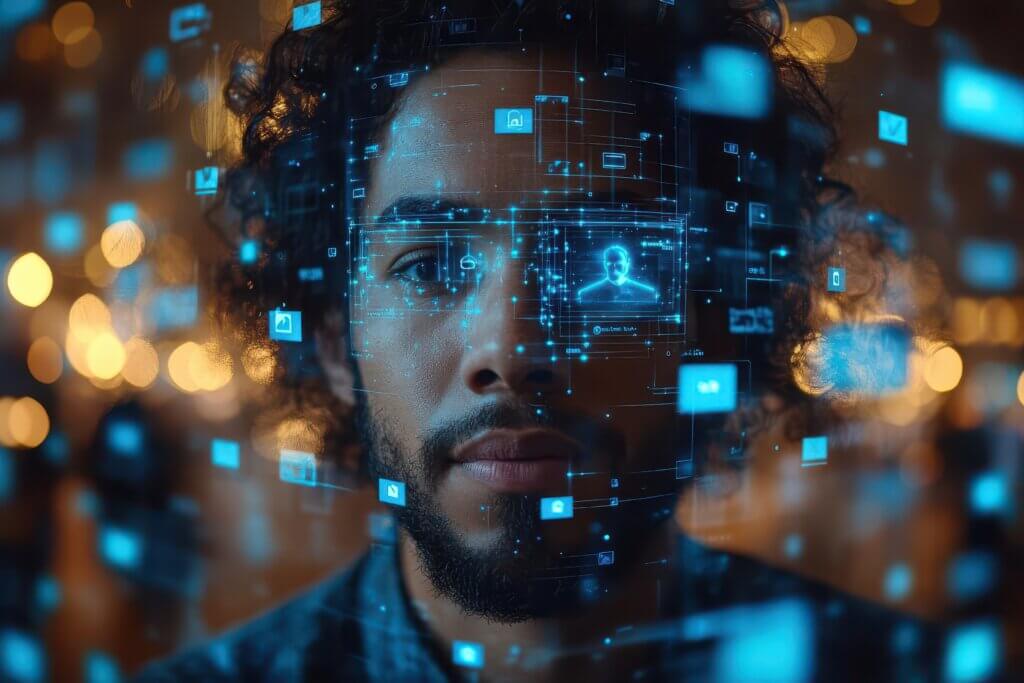Back in 1998, I saw the future before most people knew it existed. Search engines were clunky, algorithms were primitive, and the internet was a Wild West of digital chaos. That’s when I pioneered SEO with the predecessor to iCrossing – Internet Crossing – one of the best SEO companies at the time – not as a gimmick, but as a powerful way to shape influence. This was before Google was Google. Before modern social media and before Facebook existed.

Fast forward to today, and we’re at another inflection point. AI search engines and agents aren’t just changing SEO; they’re rewriting the online influence rulebook.
Just like with SEO, today, if your website isn’t optimized for AI, it may never be crawled, indexed, or surfaced in the AI-driven results that are quickly overtaking search. AI models process content differently than traditional search engines – relying on structured data, clear metadata, and efficient crawling permissions. If you’re blocking AI crawlers, failing to use proper markup, or running a slow site, AI search engines will simply ignore you.
So what happens to the tactics that built the organic search industry in the 2000s? They won’t get you where you need to go from here on. If you’re not leveraging AI-driven SEO (or AI Optimization, as we call it), you’re not just behind—you’re invisible.
The Evolution of SEO: From Keywords to Intelligence
When I started optimizing websites in the late ‘90s, SEO was about outsmarting simple algorithms. It was a technical art – a game of structure, backlinks, and strategic keyword placement. It could even be influenced with just simple iFrames back then, right about the time that Google realized its algorithm could be reverse-engineered, and decided to encrypt it.
Now, Open AI, Perplexity, Gemini and Google’s own AI-driven updates are fundamentally shifting the way digital influence is built.
Instead of just matching words, AI bots and search engines now:
- Understand intent, not just syntax, far better than search
- Personalize results based on real-time behavior and historical data
- Prioritize quality, relevance, and user experience
This means traditional SEO and search optimization won’t cut it anymore. AI is now the gatekeeper—if you don’t speak its language, you’re not getting through. Enter AIO (AI Optimization): the new era of digital strategy, designed to align with AI’s evolving algorithms and ensure your content doesn’t just rank, but resonates.
To master this shift, at Avenue Z, we’ve collaborated closely with in-house experts to develop a proprietary AIO (AI Optimization) framework. By combining deep industry insights with cutting-edge AI research, we’ve crafted a strategy that ensures content is not only discoverable but dynamically aligned with AI’s evolving logic. This isn’t just an update to SEO—it’s a future-proofed approach to digital visibility. Our CMO and Chairman of Avenue Z’s AI Council says it well:
“The brands that win in 2025 will be those that understand AI is the new gatekeeper of search. We have reached an inflection point where millions of consumers now turn to AI tools like ChatGPT, Perplexity, and Google AI Overviews for instant, reliable answers—bypassing traditional search results. If you are still optimizing the old way, you aren’t just behind, you are on your way to becoming invisible.” – Johnny Hughes, CMO and Chairman, Avenue Z’s AI Council.
Better yet, AI isn’t just reshaping search—it’s redefining influence. From what we buy to how we think and where we go, AI now drives decisions for both consumers and businesses.
How AI Optimization is Shaping Influence
In the early days of SEO, influence was built through ranking. If you dominated the top of search results, you won. Today, it’s bigger than that. Influence isn’t just about being found – it’s about shaping perception, conversation, and engagement. There are three key factors that we’ve found make all the difference when combined – consider it the ‘recipe for influence’:
⅓ – high-end media placements
⅓ – digital content (and lots of it)
⅓ – technical optimization
AI Optimization is the key to unlocking that influence – being present for all of the relevant instances. At Avenue Z, just like in the early days of iCrossing, we’re using a proprietary model to reverse-engineer influence all over again.
Here’s what we’ve found makes all the difference:
1. AI-Powered Technical SEO: The Silent Ranking Factor
SEO has never been just about content. If your site is slow, unstructured, or clunky, AI will push you down the rankings.
That’s why technical AI Optimization is now non-negotiable:
- Configure robots.txt for AI crawlers. If you block them, you’re invisible. Allow AI search bots while preventing AI training data collection.
- Avoid over-blocking AI bots. Many security tools automatically block AI crawlers, limiting your visibility. AI-driven search engines and chatbots can’t rank what they can’t access.
- Use structured data and semantic markup. AI models rely on metadata and schema.org to interpret your content correctly.
These backend optimizations ensure that AI-driven search engines can actually crawl and index your site.
2. Predictive Content Modeling: Ranking Before the Trend
Back in the day, SEO was reactive. You saw a trend, optimized for it, and hoped to catch the wave. Now, AI lets us predict the next wave before it happens.
By analyzing search data, user behavior, and industry shifts, we can create content that ranks before the competition even realizes the opportunity exists. That’s how you dominate markets – not by reacting, but by anticipating.
3. Natural Language Processing (NLP): Writing for AI and Humans
Google’s AI doesn’t just scan keywords – it reads like a human. That means content must be structured for both algorithms and audiences to drive influence.
Our approach?
- Answer high-intent search queries before users even finish typing
- Use AI-driven topic clustering for semantic relevance
- Optimize with entities, not just keywords, to match AI’s contextual understanding
When your content aligns with how AI interprets language, you don’t just rank – you own the conversation.
4. AI-Driven Authority: The Future of Link Building
Backlinks still matter—but the way we build them has changed. Instead of manual outreach and guesswork, AI-driven strategies identify contextually relevant, high-authority sites in real time.
It’s about precision, not volume. And when AI finds the right connections, rankings—and influence—skyrocket.
Why AI Optimization is a Tectonic Shift
This isn’t a trend—it’s a fundamental shift in how digital influence works. Consider this:
- AI search engines prioritize structured data and semantic markup
- Google’s AI-generated search results are changing rankings
- 50%+ of searches are voice-based, making NLP a necessity
- AI personalization means no two users see the same results
If you’re still playing by the old SEO rules, you’re already out of the game.
Take Action: Start Optimizing Today
Just like SEO in the 2000s, the best time to start was yesterday. AI is rapidly evolving beyond search, becoming the driving force behind how information is delivered and decisions are made. Soon, it will seamlessly power the technology around us, influencing everything from consumer choices to business strategies. As Johnny Hughes puts it:
“Very soon, AI will be embedded into everything from IoT devices, smart assistants, search engines, connected vehicles, and everyday technology. Large Language Models (LLMs) will power real-time answers, recommendations, and decisions relied upon by the global population. Brands that invest in AI Optimization now will be the ones shaping conversations, building authority, and staying visible in an AI-driven world.” – Johnny Hughes.
AI isn’t the future—it’s already here. The question isn’t if you should adapt, but how quickly you will. The good news? You can start today by applying AI Optimization strategies that keep your brand visible, relevant, and ahead of the competition.
Outside of some of the basic, easy AI optimization “wins” that any well-equipped digital marketing team can manage internally, there’s the analysis and broader optimization that’s best left for the experts. Here’s what I’d recommend if you’re looking to take the next step:
- Analyze Your AI Share of Voice and track your brand’s ranking on ChatGPT as a start. Here’s the AI Share of Voice Tracking Tool we’ve developed at Avenue Z.
- Implement Technical Optimization Quick Wins with robots.txt, metadata and semantic markup, a llms.txt file, and other technical tips listed in AI Search and Agents: Technical Optimizations to Improve AI Visibility.
- Engage the Experts. The new wave of AI Optimization moves too fast for most modern businesses. Any time spent catching up will be lost with those already 10-steps ahead. Enlist experts like Avenue Z to jump in quickly and make major improvements for the long term.
The brands that adapt now will be the ones leading the conversation tomorrow.
In 1998, I saw what was coming and built a strategy that defined an industry. Today, I see the same shift happening. AI Optimization isn’t optional—it’s how you stay relevant in an internet ruled by intelligence.Think on this: Influence isn’t given. It’s engineered.







